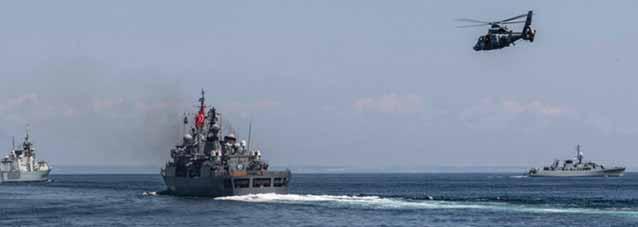
4 minute read
The Black Sea Region and Global Competition in the Midst of the Russo-Ukrainian War
from Issue #1401
the Russo-Ukrainian War enters its second year, there are many reflections on what has happened, assessments on what is happening, and speculation on what will happen in the future. No doubt, the events in Ukraine are a watershed event for the 21st century.
The Black Sea region is an area of geopolitical importance, connecting Europe and Asia and providing access to the Mediterranean Sea. It is also a major transit route for energy supplies, including oil and gas pipelines that connect Europe to Central Asia.
Advertisement
Given its strategic location, the Black Sea region is a focus of attention for many states and non-state actors seeking to influence the region's political and economic future. The region also faces a number of security challenges, including unresolved territorial disputes, economic and political instability, and the threat of terrorism and organized crime.
Most notably, the region’s political, security, and economic future is severely threatened by the Russo-Ukrainian War.
The annexation of Crimea by Russia in 2014, followed by the ongoing conflict in eastern Ukraine, has created significant instability in the region. The conflict has led to the displacement of thousands of people and resulted in a significant loss of life.
The conflict in Ukraine also highlighted the need for increased cooperation and coordination between the countries of the Black Sea region, who must work together to address common security challenges, such as terrorism and organized crime, while also seeking to resolve existing territorial disputes peacefully. Moreover, they must reassert their collective commitments to liberal democratic principles and collective security so as to thwart revanchist ideologies.
The ongoing political, economic, and security challenges in the Black Sea region were a backdrop before the recent Russo-Ukrainian War began in 2022. As
For the first time in over 80 years, an invasion by force took place on the European Continent, resulting in irreversible changes to the structure and institutions underpinning international relations since the end of World War II. These changes will impact how countries compete and cooperate for generations, if not throughout the 21st century, and will have profound effects on the Black Sea region.
During the 20th century, from the height of the cold war through the “end of history” ushered in by the fall of the Berlin Wall, world order relied on multilateral cooperative agreements across security, economic, and social spheres to ensure peace and prosperity.
This structure flourished on the liberal idealist ideology that world leaders had achieved enlightenment, and that the interconnectedness of globalization would make the costs of war untenable. This ideology was not without precedent.
Writing of the precepts of World War I, Barbara Tuchman, in the opening lines of “The Guns of August,” describes a scene of geo-political solidarity through the lens of the royal funeral of Edward VII of the United Kingdom. On the surface, the scene depicts the strong political, economic, and social bonds between nation-states. Underneath the scene lay the tectonic currents of systemic change.
Similar systemic changes are emerging today.
A broad discussion of future competition is emerging as countries, parliaments, presidents, and corporations respond to events in Ukraine. Francis Fukuyama posited in “The End of History and the Last Man” that competition was limited, as the universalization of Western liberal democracy had ascended to the final form of human government. Yet, Thucydides observations prove more resilient and relevant – that people….and countries…are motivated by fear, honor and self-interest. Moreover, as the Melian dialog reminds us, the strong do as they can and the weak do as they must. Based on the realist view of international relations, the world is moving from a system dominated by multilateralism and cooperation to a new world order. The new, dominant world order is yet to emerge, but there are directional vectors along the lines of multilateral or bilateral agreements and transactional or cooperative relationships. New competitive strategies are emerging based on these options:
- Multilateral/Transactional arrangements where countries align political, security, and economic interest with blocks of countries who share similar interests along short-term time horizons.
- Bilateral/Transactional arrangements where counties align political, security, and economic interests very narrowly with individual countries along similar, short-term time horizons.
- Bilateral/Cooperative arrangements where countries align political, security, and economic interests with countries who share similar interests and with a long-term time horizon.
The conflict between Russia and Ukraine and the enduring challenges of the Black Sea region have brought geopolitical competition and security concerns to the forefront. The conflict has had significant implications for the region, including the displacement of people, economic implications, and the potential for further escalation. It has also highlighted the limitations of international organizations in resolving conflicts, particularly when one of the key players is not willing to abide by international norms. These realities may lead some countries to pursue one of the new competitive strategies above. This would not be in their long-term interests, nor consistent with the shared interests that helped maintain peace on the continent for over half a century.
To address economic and political instability, the countries of the Black Sea region must work together to promote economic development and strengthen democratic institutions. This will require the development of common strategies to address economic and political challenges, as well as the strengthening of regional organizations such as the European Union and the United Nations to promote stability and security in the region.
Moreover, the West must continue to strengthen its military presence in the Black Sea region, with NATO increasing its military activity in countries throughout Eastern Europe and into the Caucasus, and on the seas. Increased security includes more than “boots on the ground” and should involve high level staff talks and exercises, intelligence sharing, and war planning.
In conclusion, the conflict between Russia and Ukraine has brought geopolitical competition and security concerns to the forefront for the Black Sea region. The conflict has caused significant, nearterm implications involving displacement of people, economic disruption, and the tragic loss of life. It has also highlighted the limitations of international organizations in resolving conflicts, causing some to question the value of liberal-democratic, market-economic, and social institutions. This questioning may lead to the pursuit of other competitive strategies that are not aligned with multilateralism and cooperative relationships. This would be shortsighted. Only a commitment to those liberal-democratic and collective security institutions that underpinned the world order and secured peace throughout the second half of the twentieth century will see us through the revanchist threats that the Black Sea region is facing today.










